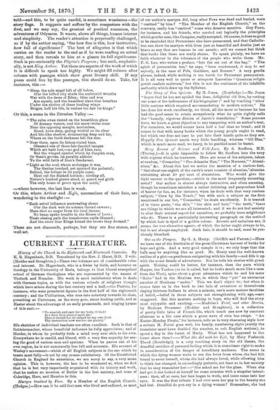CURRENT LITERATURE.
_History of the Church in the Eighteenth and Nineteenth Centuries. By K. R. Hagenbach, D.D. Translated by the Rev. J. Hurst, D.D. 2 vols. (fodder and Stoughton.)—These two volumes are of considerable value and interest. Dr. Hagenbach, who is a Swiss by birth, and lecturer on theology in the University of Basle, belongs to that liberal evangelical school of German theologians who are represented by the names of 'Tholuck and Neander. His work is most satisfactory when it deals with German topics, as with the various schools of religious thought which have arisen during the last century and a half,—the Pietists, for instance, who were prominent figures in the first half of the eighteenth -century ; and the Utilitarians, who rose into notoriety towards its close, preaching at Christmas, as the story goes, about feeding cattle, and at Easter about the advantage of an early promenade, and singing hymns of this sort:—
"To nourish and care for my body, 0 God Is a duty thou placest upon me; That it should not be ruined by my own fault Thy instruction now teaches me plainly."
is sketches of individual teachers are often excellent. Such is that of Schleiermacher, whose beneficial influence he fully appreciates; and of herder, in whom he probably finds a mind very near akin to his own. Everywhere he is candid, and liberal, with a very fine capacity for see- ing the good of various men and systems. When he passes out of his own region, he is not unnaturally less full and accurate. His account of Wesley's movement—which of all English subjects is the one which he treats most fully—is not by any means satisfactory. Of the Established Church in England he entertains, we are sorry to say, a very mean opinion. This is, however, the less to be wondered at, when we find that he is but very imperfectly acquainted with its history and work, that he makes no mention of Butler in the last century, and none of Coleridge, Hare, and Maurice in this.
Martyrs Omitted by Foxe. By a Member of the English Church. (Hodges.)—How can it be said that men who lived and suffered, as most
Of our author's martyrs did, long after Foxe was dead and buried, were "omitted" by him ? "The Member of the English Church," on the contrary, really has "omitted" some who deserve mention. Guy Faux, for instance, and his friends, who carried out logically the principles which gentler men, like Campian, really accepted. Of course, it does us good to be reminded that Protestants also have persecuted, and that Catholic-
ism can show its martyrs with lives just as beautiful and deaths just as brave as any that are famous in our annals ; still we cannot but think
that books like these are really shams. To speak plainly, we have no faith whatever in the tolerance of the people who write them. Mr. F. G. Lee, who writes a preface, "lets the cat out of the bag." "The
spirit of persecution has," he says, "been condemned, it may be not unjustly, in the case of Pole, Gardiner, and Bonner." A very gentle phrase, indeed, while nothing is too harsh for Protestant persecutors. It is all very well to quote or misquote Lucretius " Quantum'religio potuit suadere malorum," but this is not the sentiment of the infallible authority which drew up the Syllabus.


































 Previous page
Previous page